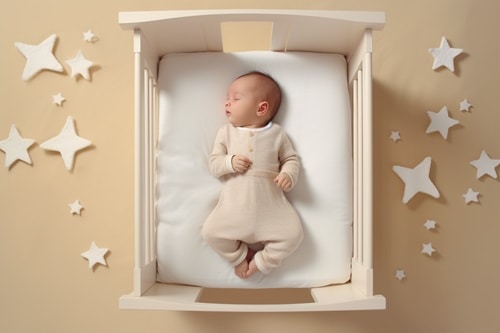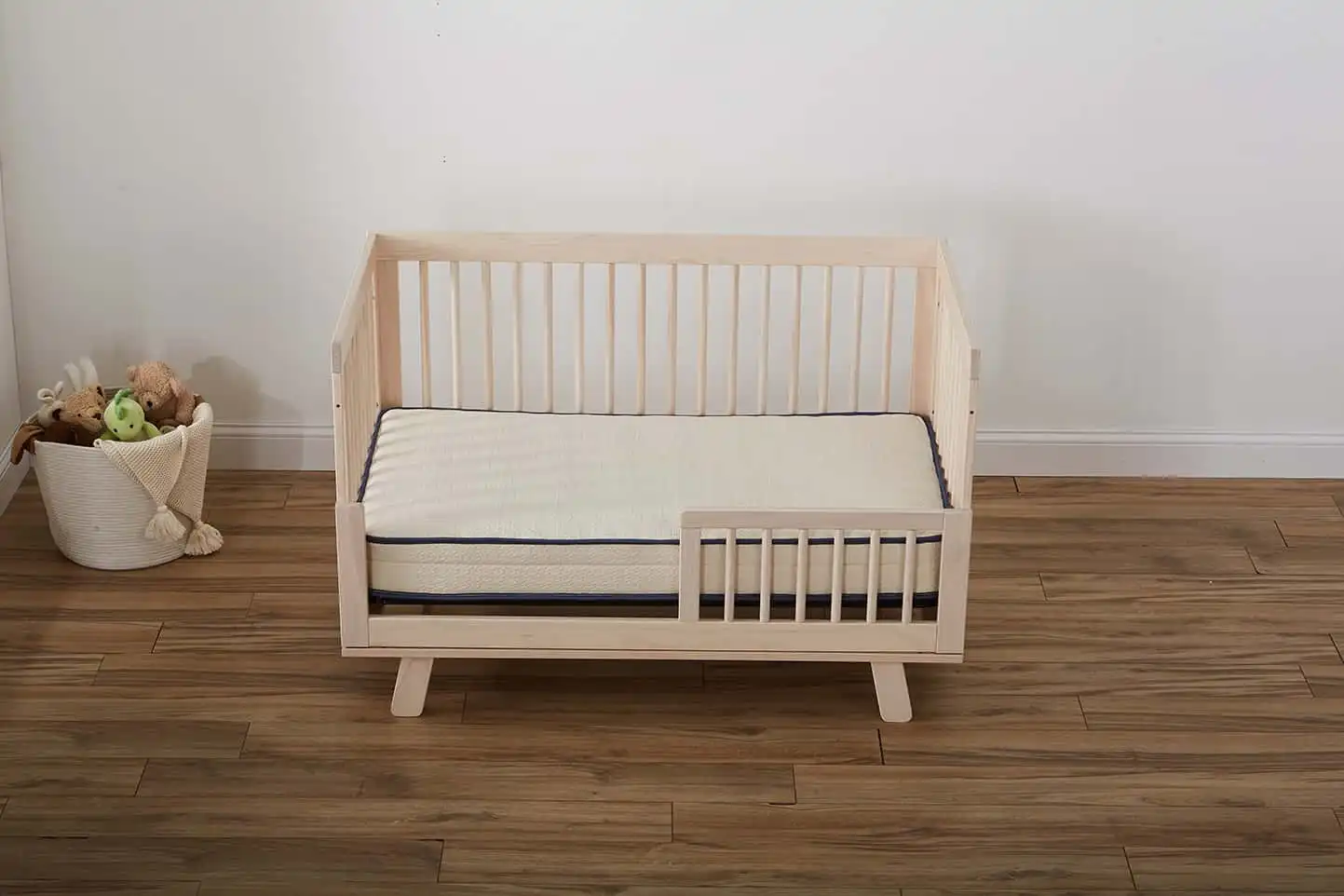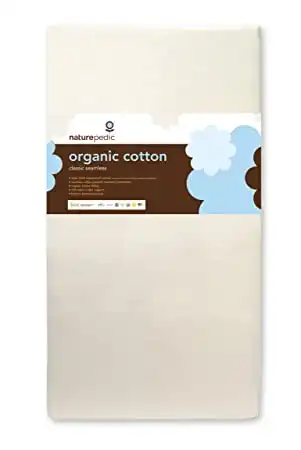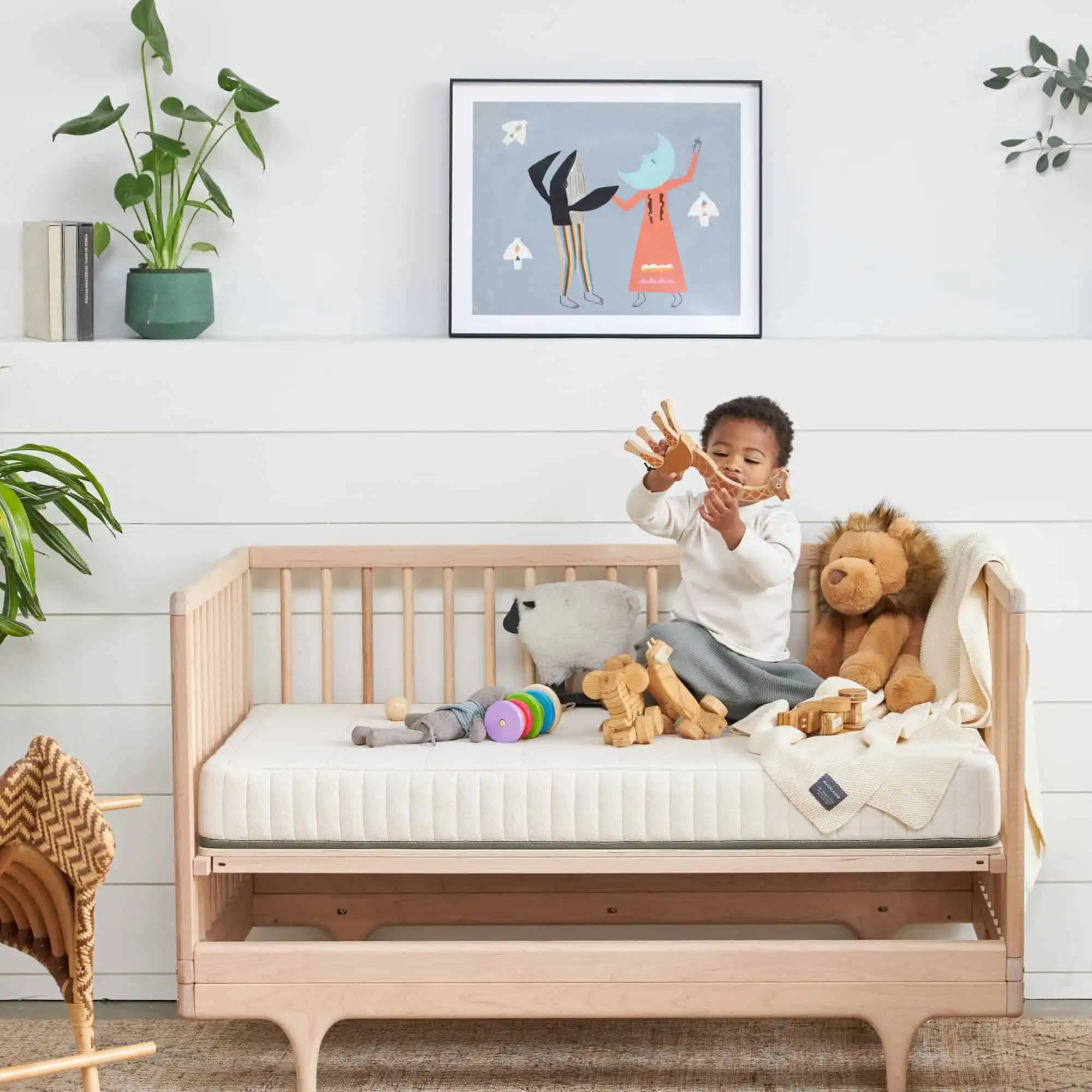- You are here:
- Home »
- Non Toxic Nursery »
- Are Baby Mattresses Toxic?
Are Baby Mattresses Toxic?
Selecting a crib mattress is a critical decision for expectant parents, given that a new baby spends over 70% of their time sleeping in their crib. Safety and comfort are paramount, making the choice of a crib mattress a decision of great significance.
In recent years, awareness has grown about the potential dangers lurking in non-organic crib mattresses, prompting parents to seek healthier alternatives.
This article explores the risks associated with traditional crib mattresses, discusses chemicals like phthalates and PVC, and provides tips and recommendations for selecting a safe, organic crib mattress.
Chemicals in Traditional Crib Mattresses
In this section, we will discuss some of the most common chemicals found in traditional crib mattresses and their potential health risks:
Vinyl Covering and Phthalates:
The moisture-proof vinyl covering in non-organic crib mattresses presents additional concerns. According to the FDA, this material has been known to cause allergic reactions in humans, and its lack of breathability restricts airflow, potentially leading to discomfort for the baby.
Phthalates are a group of chemicals commonly used to soften vinyl and make it more flexible. These compounds have been associated with various health concerns, including disruptions in hormone regulation. Choosing a crib mattress labeled as phthalate-free can be a proactive step in minimizing potential exposure.
VOCs:
Volatile Organic Compounds (VOCs), found in synthetic materials, can emit harmful gases into the air and affect a baby’s respiratory health. Studies on baby exposure to VOCs through crib mattresses have shown a direct correlation with respiratory problems like asthma.
New mattresses release more VOCs than used ones, and this is influenced by the type of foam material and the presence of a mattress cover. Polyurethane foam emits a wider range of VOCs compared to polyester foam in crib mattresses.
Babies might breathe in more VOCs because they inhale a lot of air for their size. The air near a source (like a crib mattress) can have higher pollutant levels compared to the rest of the room.
Flame Retardants:
Polybrominated Diphenyl Ethers (PBDEs) are flame-retardant chemicals used in mattresses that have been phased out in some countries due to their toxicity. However, they are still found in traditional crib mattresses and can pose health risks if ingested by infants.
Other toxic compounds found in some flame-retardants are phosphorus, antimony, and arsenic. These substances are used in flame retardant chemicals, and they can off-gas, leading to potential inhalation by infants. Studies show that both antimony and arsenic are cancer-causing agents.
|
$289 (Promo Code: GreenSnooze $20 Off)
|
$269
|
$349
|
Read More: Best Organic Crib Mattress Protectors
Benefits of Organic Crib Mattresses
If you are concerned about chemicals present in traditional crib mattresses, an organic mattress may be the best option for your baby’s health and safety. Here are some of the benefits of choosing an organic crib mattress:
- No Harmful Chemicals:
Organic mattresses do not release toxic chemicals, reducing the risk of SIDS and providing peace of mind. - Natural Flame Retardants: Organic crib mattress use natural flame retardants such as wool or silica, meeting safety regulations without the need for harmful chemicals.
- Hypoallergenic: Organic materials are naturally hypoallergenic, making them an ideal choice for babies with sensitive skin or allergies.
- Breathable Materials:
Organic mattresses promote breathability, reducing the risk of overheating and providing a comfortable and safe sleeping environment for your baby.
Read More: Best Tips for a Chemical-Free Nursery
Choosing the Right Crib Mattress
When selecting an organic crib mattress be sure to do your research and verify manufacturer’s claims. To pick a safe crib mattress consider the following factors:
- Certifications: Look for Greenguard GOLD, GOTS, Oeko-Tex, and CertiPur-US certifications because they provide assurance of safety, indicating that the mattress meets stringent standards. While GOTS certification ensures the materials used in manufacturing are organic, Greenguard GOLD and Oeko-Tex certify that the mattress does not contain harmful substances. If you decide to buy a synthetic foam crib mattress, make sure it has CertiPur-US certification. It ensures that the mattress does not release harmful gases and follows strict manufacturing guidelines.
- Material: Opt for mattresses made from 100% organic materials, often certified organic cotton, organic wool and natural latex, because they offer a natural and safe sleeping surface. They also provide breathability, ensuring that your baby does not get too hot while sleeping.
- Comfort: Choose a firm and comfortable mattress to reduce the risk of SIDS. An excessively soft mattress can pose suffocation risks for infants. Ensure the mattress has enough support for your baby’s growing spine and is free from lumps or indentations.
- Environmental Impact: Choosing organic contributes to a healthier environment for future generations, as organic materials are produced without harmful chemicals.

Best Organic Crib Mattresses
A non-toxic crib mattress is a significant investment in your baby’s health and provides peace of mind for parents. Consider the following highly-rated organic crib mattresses when making your purchase:
Naturepedic Classic Crib Mattress
Materials: Organic Cotton, Biodegradable Sugarcane-Derived Polyester
Certificates: GOTS, Greenguard GOLD, Made Safe
- Certified organic cotton construction because it ensures that the mattress is made from organic and non-toxic materials.
- Greenguard GOLD-certified for low chemical emissions, providing additional assurance of air quality in the nursery.
- Natural flame retardant without the use of chemicals, ensuring safety without compromising health.
Emily Crib Mattress by My Green Mattress
Materials: Organic Cotton, Eco-Wool
Certificates: GOTS, Oeko-Tex, Greenguard GOLD
Promo Code: GreenSnooze ($20 Off)
- Made with GOTS-certified organic cotton, guaranteeing that the materials are grown without synthetic pesticides or fertilizers.
- Oeko-Tex-certified for safety, indicating that the mattress is free from harmful substances, making it a reliable choice for your baby.
- Free from harmful chemicals and flame retardants, ensuring a pure and safe sleep environment for your infant.
Conclusion
Investing in a safe and organic crib mattress is a proactive step toward ensuring the well-being of your baby. Non-organic crib mattresses may pose risks due to the presence of harmful chemicals and materials. By choosing organic options, parents can provide their newborns with a healthier and safer sleeping environment.
Prioritizing certifications and understanding the potential hazards associated with traditional mattresses empowers parents to make informed choices, contributing not only to their child’s immediate well-being but also to the long-term health of the environment.
If you want to create a truly toxin-free nursery, you should also consider using organic baby bedding and Greenguard GOLD-certified crib. By taking a holistic approach to your child’s sleeping environment, you can provide peace of mind and promote their overall health and well-being.
About the Author Kamila Flieger
My name is Kamila, and I'm passionate about researching non-toxic, organic products for the home. I believe it's so important to create a safe and healthy environment for our families, and I enjoy helping others do the same.




